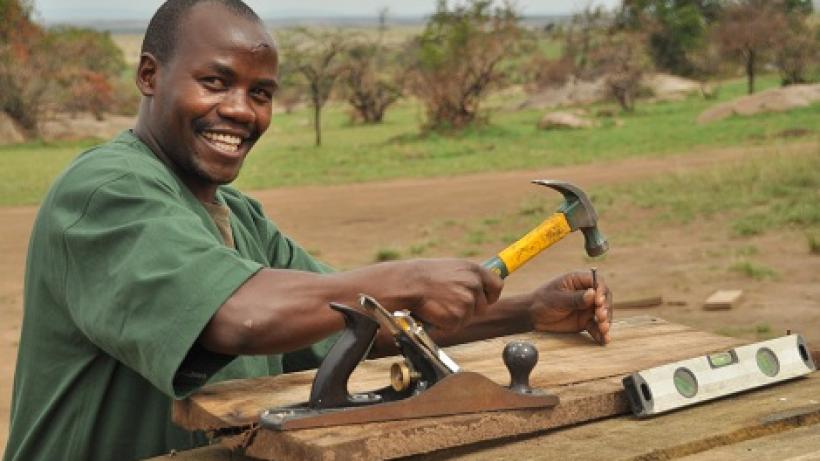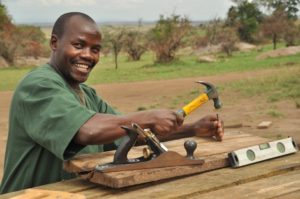
The story of José: 9 steps to turn the Mozambican construction boom into an engine for inclusive growth
The construction industry is the backbone of economic growth in many developing countries, including Mozambique where the industry grew by nearly 12% in 2015. Through the story of a young Mozambican carpenter, IGC Economist Novella Maugeri summarises the results of a recent study on the construction industry in 9 steps that could help to turn the recent construction boom into an engine for inclusive growth.
José was born 22 years ago in Moamba, a small town one hour from Maputo, the capital of Mozambique. Second brother of four, José’s family was poor so he quickly realized that learning something practical like carpentry could substantially improve his life and boost the income of his family. As a consequence, at 12, while he was attending secondary school during the day, he also started going on a sort of apprenticeship by his neighbour’s carpentry shop during the evenings. Then he realized there was a technical school right in his town with a specialized course in carpentry and after his diploma, he went for it. José was lucky. He had a technical school available in the city where he lived, so at 18 he was able to move to Maputo city where he started working as a professional carpenter in the various construction sites that were sprouting up all over the city due to the boom that was in full swing in 2010.

Mozambican firms are desperately looking for people like José. A recent study released by the IGC in Mozambique finds that Mozambican firms in the civil construction segment report a considerable shortage of carpenters, locksmiths, electricians, and plumbers. These firms also lament the lack of experienced senior managers, project managers, master-builders, and skilled masons. This is a well-known barrier to firm development. However, firms in the building materials segment, an important part of the civil construction sector, regard the lack of certification standards as a more significant barrier than the lack of qualified manpower, probably because they tend to rely on a more low-skilled workforce. This suggests that an expansion of this subsector could mean that José’s second brother who did not go to a technical school would then also stand a chance to be hired in this sector. However, despite the construction boom, the building materials sector (cement, iron and glass, among others) has grown by a yearly average of only 2% in the period 2005–12 (Sutton, 2014). Consequently, contractors keep covering the domestic supply gap with imports, thereby leaving unrealized potential for domestic growth and job creation.
In 2015 the construction industry grew by nearly 12% in 2015, indicative of its important role in the Mozambican economy. The challenge Mozambican policymakers now face is how to devise policies to maximise the sector´s contribution to job creation and inclusive growth in the medium-long term. It is for this reason that the IGC has produced a study that could provide the basis for a future policy for the construction and building materials industries..
The study presents 9 recommendations, in the form of practical strategies that – if implemented by the government – could help the average Mozambican, like José or his brothers, benefit from the spillovers of the construction industry boom.
1. Construction firms need to collaborate more among each other if they want to be heard at the government level.
As it turns out from the evidence gathered from the study, Mozambican construction firms rarely collaborate as they are significantly dispersed along the country and the few associations that exist remain weak at the local level, and distant from decision-making centres. This implies a limited two-way flow of information with government officials, and reduces the chances for effective intervention. To remedy this, the study recommends strengthening the level of coordination and the flow of information, both within the private sector, and between the government and the private sector.
2. Foster more effective horizontal and vertical cooperation within sector to increase trust and reduce search and screening costs.
The study suggests a rethinking of the system of incentives beneath the public procurement system. From the vertical perspective, this would imply increased subcontracting of local firms, especially for larger/more complex projects. From the horizontal perspective, it would entail encouraging construction firm consortia. These consortia would contribute to an environment of greater mutual trust and increased knowledge-sharing, leading to an improvement of methods and results.
3. Train more skilled workers like José
There is a huge unemployment problem in Mozambique, especially for people living in rural areas and without professional skills or formal education (official unemployment rate 22.6%). The construction industry is intrinsically labour-intensive, representing a significant opportunity for job creation, if well exploited. In light of the shortage of technical specialists throughout the construction sector, our study recommends establishing a comprehensive program for technical training and skills acquisition, with a focus on the mid-ranks of the workforce. This program must seek the active involvement of the public and private sectors, and, most importantly, of education and training institutions.
4. Put in place the right system of incentives for Mozambican firms to actually hire more skilled workers like José.
Right now, the standard practice of many firms in the sector is to hire informal workers and pay them as low as possible, resulting in low product quality and in the impossibility to comply with international standards. Therefore, the study recommends finding ways to reduce the level of informality, for example by considering a revision of the current regime of direct and indirect taxation and benefits, as well as by reducing the overall level of bureaucracy in the sector.
5. To increase the overall level of product quality and industry productivity it is also important to improve the management practices used by José´s superiors.
A recent study found that Mozambican firms score very low in terms of management practices and quality. The construction industry is no exception. A way to foster better management practices could be to introduce a set of instruments allowing managers to assess regularly their own management practices, identifying areas for improvements. Another tool suggested by our study to foster the transfer of technical and managerial know-how is to establish incubators for small and medium-sized firms, in cooperation with both domestic and foreign firms. Finally, in other countries like Brazil it has proven useful to introduce a gradual scoring system in all public tenders that rewards certification and conformity to international standards. A somewhat similar system could be piloted in Mozambique to assess its potential.
6. Make sure that ‘Made in Mozambique’ becomes a seal of quality.
A multi-pronged approach would be required to progressively bring Mozambican firms up to international standards. Firstly, Mozambican firms must be encouraged to bid for and engage in public works of increasing complexity, starting with simpler projects (such as building secondary roads), and progressing primarily through multi-year maintenance contracts of public assets (such as highways), sanitation and irrigation works. Secondly, the emergence of cooperative ventures among Mozambican firms and primary contractors of major public works should be incentivised, so that they can provide technical assistance to their less experienced partners. These smaller companies can serve as suppliers, as subcontractors or as part of a cooperative, working to execute public projects of greater complexity.
7. Developing the internal housing market is key.
Although José’s generation will assure a continuously increasing demand for housing, developing a market for first-time house buyers and young families in Mozambique may still seem like a chimera. For this reason, our study suggests establishing a national plan for social housing focusing on medium and low-income earners. Firstly, this should encompass a detailed strategy on how to develop the local mortgage industry with the active involvement of private banks. Secondly, the plan would promote the introduction of cost-efficient construction processes directed at large-scale housing projects. It would also be important to ensure that these processes adapt to regional and urban-rural variations, including the use of local designs, raw materials and methods.
8. Be smart about the use of Mozambique’s natural resources.
Mozambique has very rich mineral deposits (including coal, iron, limestone, gemstones and heavy minerals) that could be used by the construction industry. Furthermore, huge deposits of natural gas have been discovered in the North of Mozambique. Over the coming years Mozambique will need to define how best to make use of its reserves and in particular what share to allocate to domestic consumption. Natural gas has many alternative uses, both as a fuel and as an input into productive processes in the construction sector. As such, Mozambique could become a regional hub for building materials. To stimulate this, the study suggests defining two or three production clusters of construction materials, taking into account the source of the raw materials, transportation logistics and the market.
9. Last but not least: access to credit matters!
Mozambican firms cite poor access to credit as one of the strongest obstacles they face to their continuing growth and development. Based on the experience of other countries, the study underlines the importance of two main elements in creating a dynamic construction industry with active participation of small and medium-sized contractors. The first is to progressively involve commercial banks, insurance companies and capital markets to foster the development of a securities market (such as infrastructure bonds and other types of bonds). Secondly, the creation of an efficient market for equipment leasing would alleviate the credit constraint.
Private sector formal employment opportunities for young Mozambicans like José are very limited, even after including new opportunities in extractives-related ‘mega projects´. To address this challenge, Mozambique needs to diversify its productive structure while at the same time exploiting the jobs creation potential of the sectors that are experiencing strong growth.
The recent boom in the construction industry is an opportunity not to be missed, but only in a few years’ time we will be able to say if it actually became a success story from the perspective of José’s offspring.
Note: this blog post is available also in Portuguese HERE.

